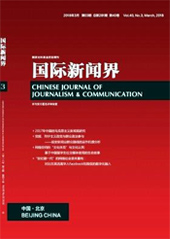News
Historical Materialism and the Development on the History of Chinese Journalism Practice
Author: Time:2020-11-08On the morning of November 8, 2020, the opening ceremony of the Ninth Youth Forum on Journalism and Journalism Research Association of Peking University was held in Hunan University Supercomputing Center. At the opening ceremony, Professor Wang Runze of School of Journalism and Communication of Renmin University of China delivered a wonderful speech with the theme of "Historical Materialism and the Development on the History of Chinese Journalism Practice", which clarified the significance of Marx's historical materialism and the history of practice in the study of journalism history. Professor Wang gave us an interview during the intermission.
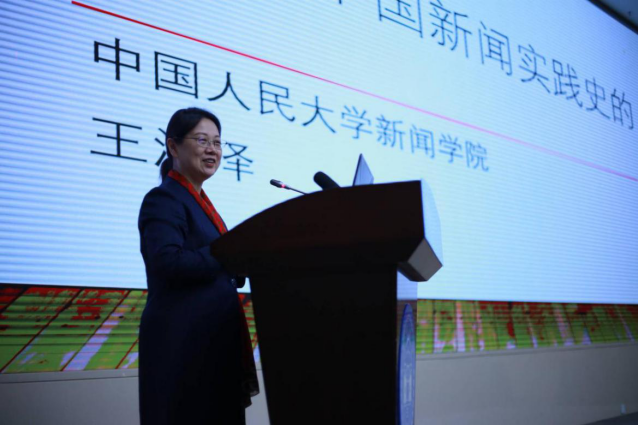
(Professor Wang was giving a speech)
"Under the background of practice, journalism is in a changing process ."
In Professor Wang's speech, she repeatedly stressed the importance of the study of practical history. What is the history of practice? Why we study the history of practice? Professor Wang gave her answer: journalism itself has a strong practicality, and it is in a continuous change. She believes that the journalism industry has a significant feature -- changeability. "As a scholar said, the entire journalism industry is now‘liquid', however the original journalism and journalism research are more solid, and could be grasped, touched and held. And the past journalism and journalism research are based on a lot of accepted rules that we can use. But now these rules can not be grasped ,because they are deconstructed and become liquid."
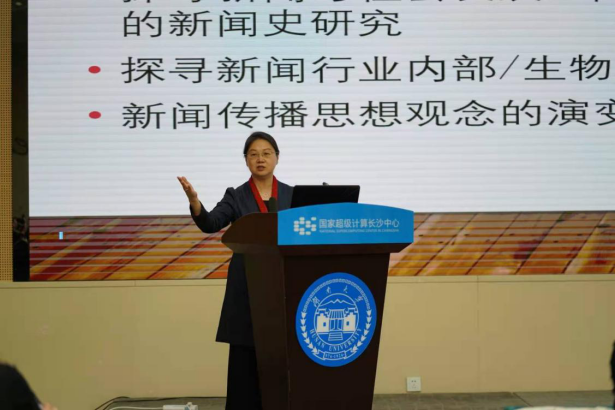
(Professor Wang was giving a speech)
Both the principle of news authenticity and the theory of 5w are actually extracted in the long process of news development. The value is from people's subjective refinement, and the standard of value itself is in a changing process. Especially in the era of media convergence and self-media, some journalism values have been slowly changing, and some traditional expressions of theories or values may no longer be applicable to today's society. Previously, the production of news must have a qualified standard. Without these standards, it can not be counted as a real news. But when the age of media convergence or new media comes, we will find that some of the products that break 100,000 or millions of page views on the Tik Tok and some public platform of Wechat do not meet the standards of traditional cognition. Therefore, under the background of this change, we need to study the history of journalism practice and the practical process of constructing this social cognition.
Under the background of the change of times, in the face of some traditional theories, some people may feel a sense of anxiety with broken value. Professor Wang pointed out:" I think this is understandable. If we have more historical literacy, we will find that this is actually a very normal phenomenon. It is actually a process of change." At the same time, she suggests that if you can put the journalism under the background of the history of practice, you will find that it is in a changing process all the time. This change is a reasonable existence and will be a normal state.
However, this change does not mean that the traditional news theory system will be completely disintegrated. Professor Wang pointed out that some of the core theories, such as the principle of news authenticity, will be given more solid and rich connotations.
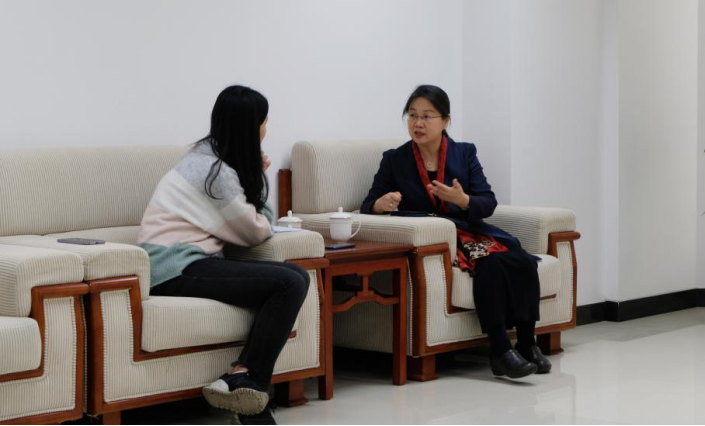
(Professor Wang was being interviewed.)
“Academic study that can last for a long time will surely spread around the world ."
Professor Wang has always been concerned about the impact of western cultures on Chinese culture. She said:" now the tendency of westernization in the academic study is more prominent, but the academic tradition with Chinese characteristics has not been completely discarded. We will certainly do better in the innovative research of journalism history."
Professor Wang expressed her concern about the problems existing in the current academic exchanges between China and the West. "We have been communicating for many years. Especially before the COVID-19 and the prevalence of Trump unilateralism, the cultural and academic exchanges between Chinese and Western are very good. But when Sino-US trade and ideological conflicts come, we will find that so much effort does not seem to have done much ." Professor Wang added :" China is not only a culture, but also a civilization ." During the outbreak of the COVID-19, there is still a gap in the culture, values, communication system and discourse system between the East and the West that lead to the false reports of the western media on China.
The key to the internationalization of Chinese academic research, especially the study of news history, is to be able to enter the western cognitive system. She said,“China is a power on history study.”Faced with the current barriers to exchanges between China and the West, Professor Wang put forward her own views --“there is no need to be too anxious.”Academic study, it really needs long time to get achievement. I personally feel that the best academic study must could be washed down by time. And good results that after test of time , will certainly spread ."
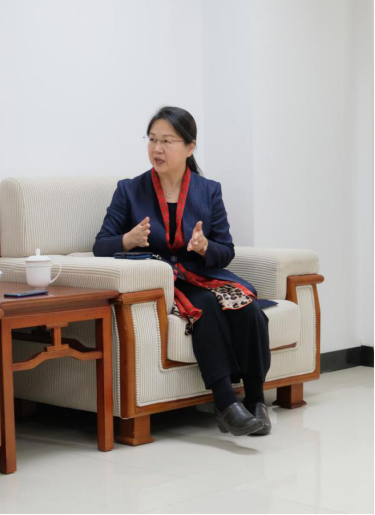
(Professor Wang was being interviewed.)
"To study the history of journalism, we should be problem-conscious ."
"We don't want to see it as an adjunct to other research ," she said, "We should have our own research."
Referring to the subject status of journalism history research, Professor Wang once again emphasizes the construction of the subjectivity of journalism history research.
"At present, we emphasize the integration of disciplines, but the premise is that the core issues and concepts of the subject must be irreplaceable and unshakable. That is to say, this is my problem, this is not your problem.And I solve the problem of my subject, not a problem of politics or sociology. This is very important for journalism, because compared with other long history of humanities and social disciplines ,our discipline has a relatively short history. We should consolidate the foundation and the status of journalism, so as to contribute to other disciplines."
"Study more problems," said Professor Wang in her paper 10 years ago. It is also a necessary method to construct the subjectivity and independence of journalism history research. In her view, the independence and subjectivity of journalism history research are supported by a tiny problem. As she said:" You have your own opinion on every very important issue, then you have more say in the subjectivity of the whole subject ." However, how to construct such subjectivity and independence? Professor Wang uses Mr. Fang Hanqi's "drilling well" metaphor to illustrate the importance of problem consciousness:" Mr. Fang says that the study of journalism history is a deep well. You must have a problem consciousness when you drill a deep well, right? You also need to have a analysis and understanding of the most important and valuable problems in this well."
In Professor Wang's view, studying problems with problem consciousness can make historical facts more valuable than drawing history. "If you use a problem consciousness and a theoretical framework to interpret the news material in a deep way. It's like you use a pressure cooker to make food, and you'll squeeze out the nutrients in that material, and you' ll show it the most important and valuable thing in the history ."
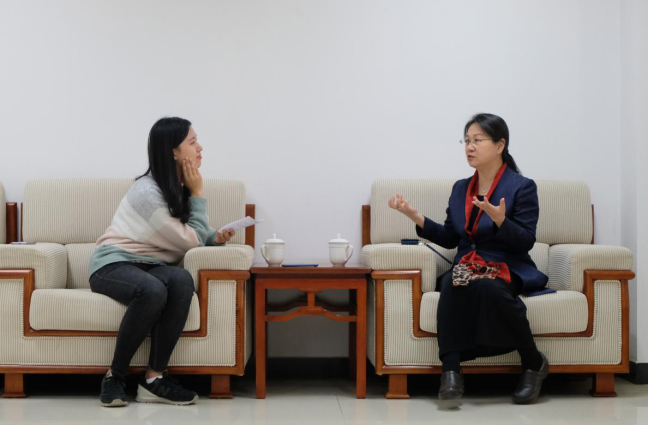
(Professor Wang was being interviewed.)
"Journalism history is not a well-known study, but it's future can not be underestimated ."
In addition to constructing the subjectivity and independence of journalism history study, what efforts should be made in the current study of journalism history? Professor Wang believes that the matching of research problems and research methods is also very important. But she also expressed her satisfaction about the journalism history:" Journalism history is not a well-known study , but every scholar is working hard. Everyone is constantly developing in their respective fields. The achievements of China's journalism history and its contribution to journalism in the future can not be underestimated ."
We should bear the loneliness in our long academic career .In Professor Wang's view, historians is a group that grow with the growth of their own knowledge and experience. "Read the classics often, and then reflect on the research you've done. You may have different views on the same issue as the literature accumulates and experiences grow ."
Professor Wang also expressed her views on the educational practice of current journalism history. In the face of the general feedback from the students about the boring study of news history, Professor Wang admitted :" This is essentially a new issue in the information age. And specific to each class, it also be related to the presentation of teachers ."
However, in Professor Wang's view, this seemingly "boring" of news history also has its own advantages:" the more boring knowledge, the more likely to bring you a different kind of theoretical and academic exercise. So do not reject those boring things,and try to listen to boring things. Then you may improve your academic attitude and ability."


